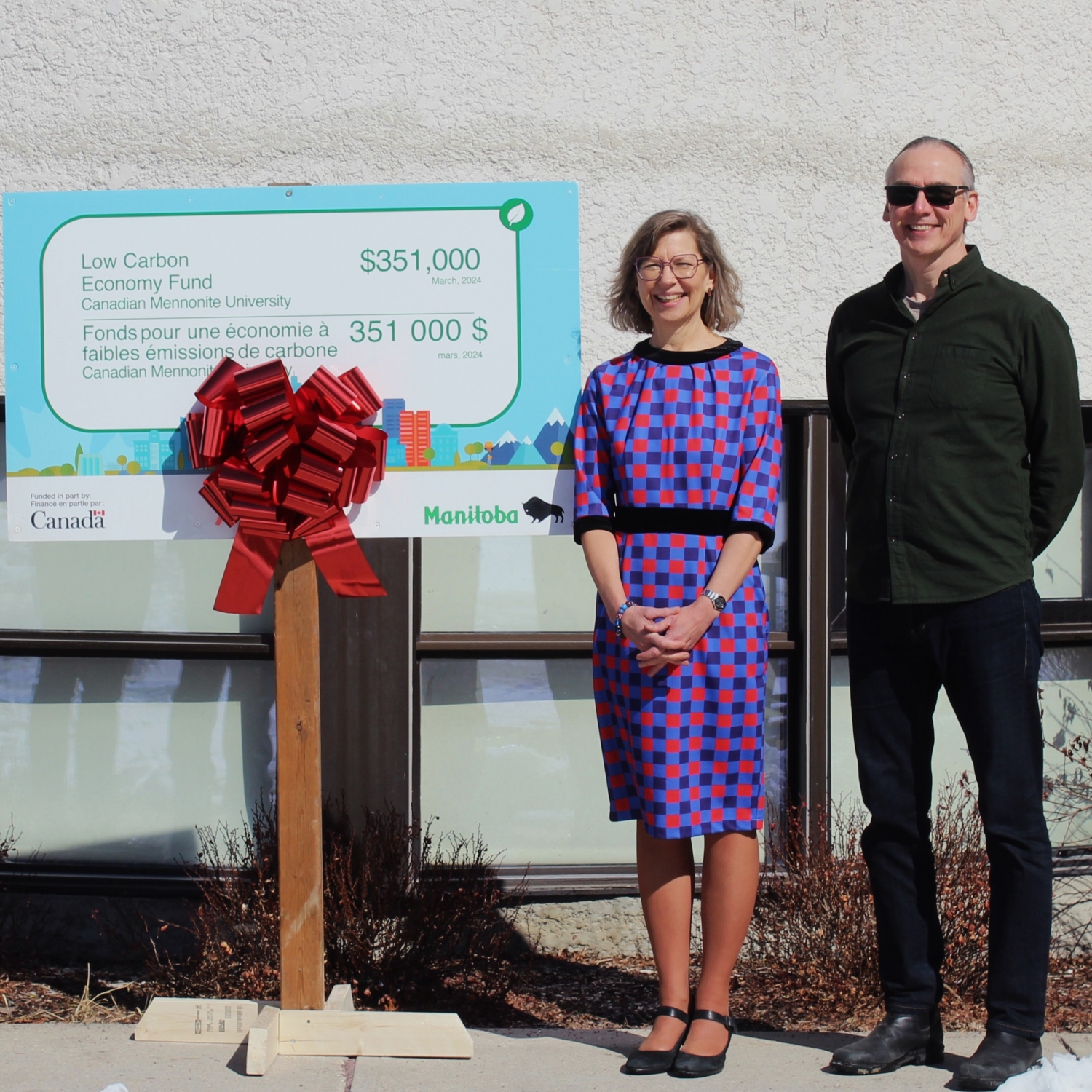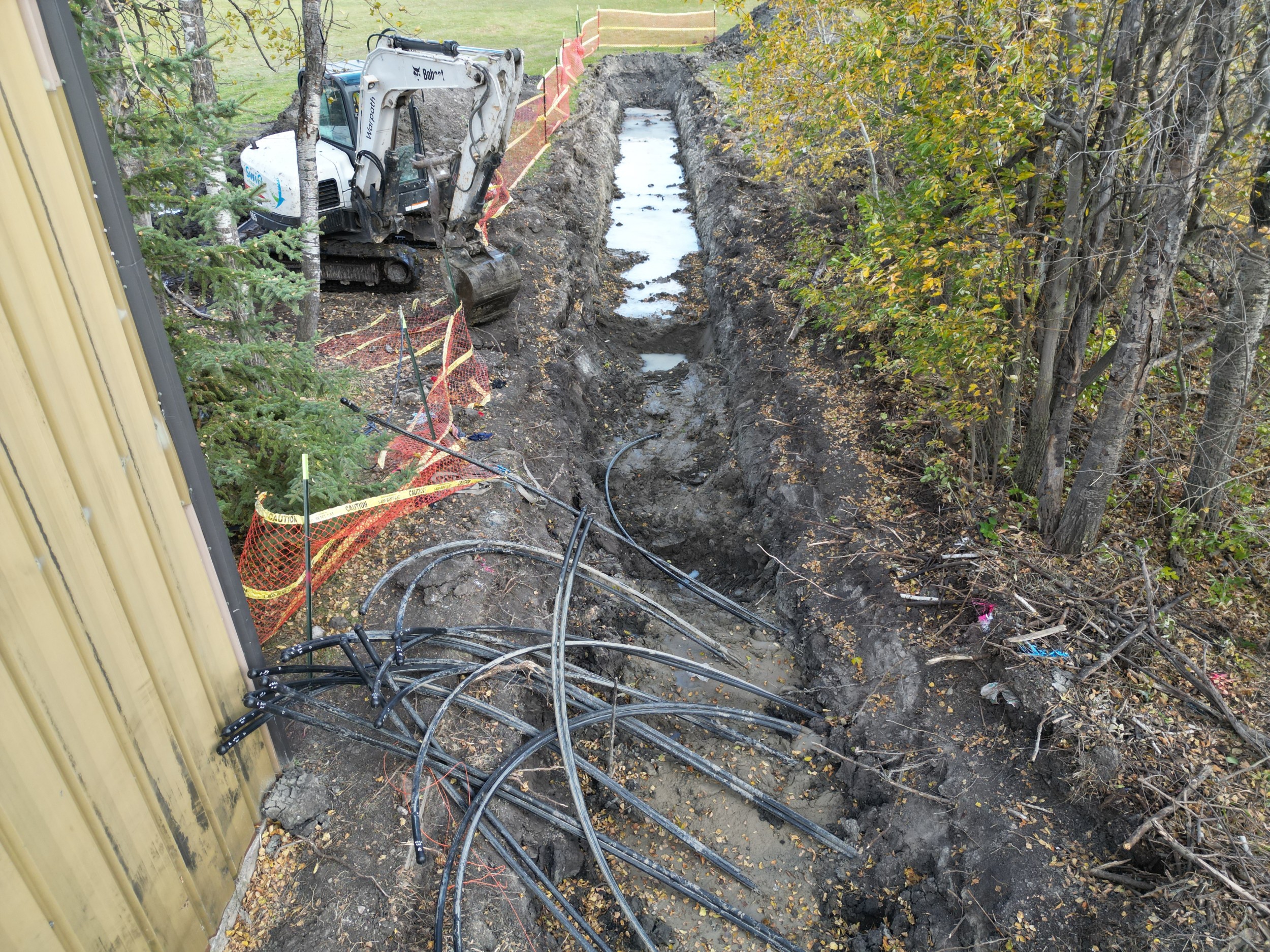News and Releases

Stories
Completion of geothermal field a milestone in renovation project and improved sustainability
Thursday, June 19, 2025 @ 9:56 AM | Stories
 CMU President Cheryl Pauls with Rob Froese, project manager for the Poettcker Hall renovation initiative
CMU President Cheryl Pauls with Rob Froese, project manager for the Poettcker Hall renovation initiative
Over the past few months, CMU's Uphold Campaign, which is revitalizing and renewing the Poettcker Hall residence at CMU, has made significant strides with the installation of a new geothermal field to provide heating and cooling to the dormitory.
In mid 2024, CMU was the recipient of $351,000 in funding from the Government of Manitoba through the Merit-based Low Carbon Economy Fund, a collaborative funding initiative between the Government of Canada and the Manitoba government.
This funding was used toward CMU's Geothermal Campus Project, where hydronic lines were installed in Poettcker Hall to deliver sustainable heating and cooling from the new geothermal field.
Over 10 kilometres of pipes were installed in the ground as part of a project that converted the mechanical systems of the Poettcker Hall residence and a portion of the South Hall building from gas-fired boilers to the new geothermal ground loop system.
Poettcker Hall was CMU's most carbon-intensive and least energy-efficient building. By replacing the current natural gas boiler with a net-zero-carbon and net-zero-energy geothermal ground loop system, CMU projects that the upgrade will reduce campus-wide greenhouse gas emissions by 17% annually. Specifically, this means a reduction of 400 tCO2e by 2030.
Rather than simply tearing the building down, retrofitting Poettcker Hall with geothermal helps divert roughly 16000 tCO2e that is trapped in the building. These are materials like brick, metal, copper, or other valuable resources mined from the earth that have significant environmental impacts when disposed of in a landfill.
Poettcker Hall has housed generations of CMU students for nearly seven decades. As CMU continues to grow, so must the existing infrastructure in a way that aligns with CMU's beliefs in environmental sustainability.
Kara Klassen, Facilities Manager at CMU, says, "The modifications have helped extend the life of the building, ensuring that we can continue operating our residence programs for many years to come in a quality building."
 Over 10 kilometres of pipes were installed underground on the south side of the CMU campus. These pipes will sustainably deliver heating and cooling to Poettcker Hall and other south side buildings.
Over 10 kilometres of pipes were installed underground on the south side of the CMU campus. These pipes will sustainably deliver heating and cooling to Poettcker Hall and other south side buildings."As CMU grows our student body, we need to ensure that students who wish to live on campus have easy access to quality dorms that can enhance their learning experience," Klassen says.
Responding to the project's particulars, Ed Lohrenz, founder of GEOptimize, says geothermal takes advantage of the energy stored in the earth, "Plastic pipes are buried in the ground and fluid is circulated through it, and the heat pumps that are located in each building."
"[The pipes] cool the fluid, and it is circulated back to the pipe in the ground. Since it is colder than the surrounding earth, heat moves from the earth to the fluid in the pipes. It is cooled again by the heat pumps and, much like a refrigerator, the heat it produces is transferred to the building," Lohrenz says.
Concord Hall, another of CMU's residence buildings built in 2005, is already equipped with geothermal energy. It contributes to less than 0.5% of CMU's total emissions.
The generous support of donors, as well as the funding provided through the Merit-based Low Carbon Economy Fund, goes a long way in helping CMU as it continuously works to make the campus more environmentally sustainable.
To date, over 230 generous donors have given from $25 to $1 million to help CMU achieve 64% of the fundraising target of $3,750,000. In total, the $8,200,000 project is funded through a combination of mortgage financing and fundraising.
To learn more about or to support the Uphold campaign, visit cmu.ca/uphold.

 Print This Article
Print This Article